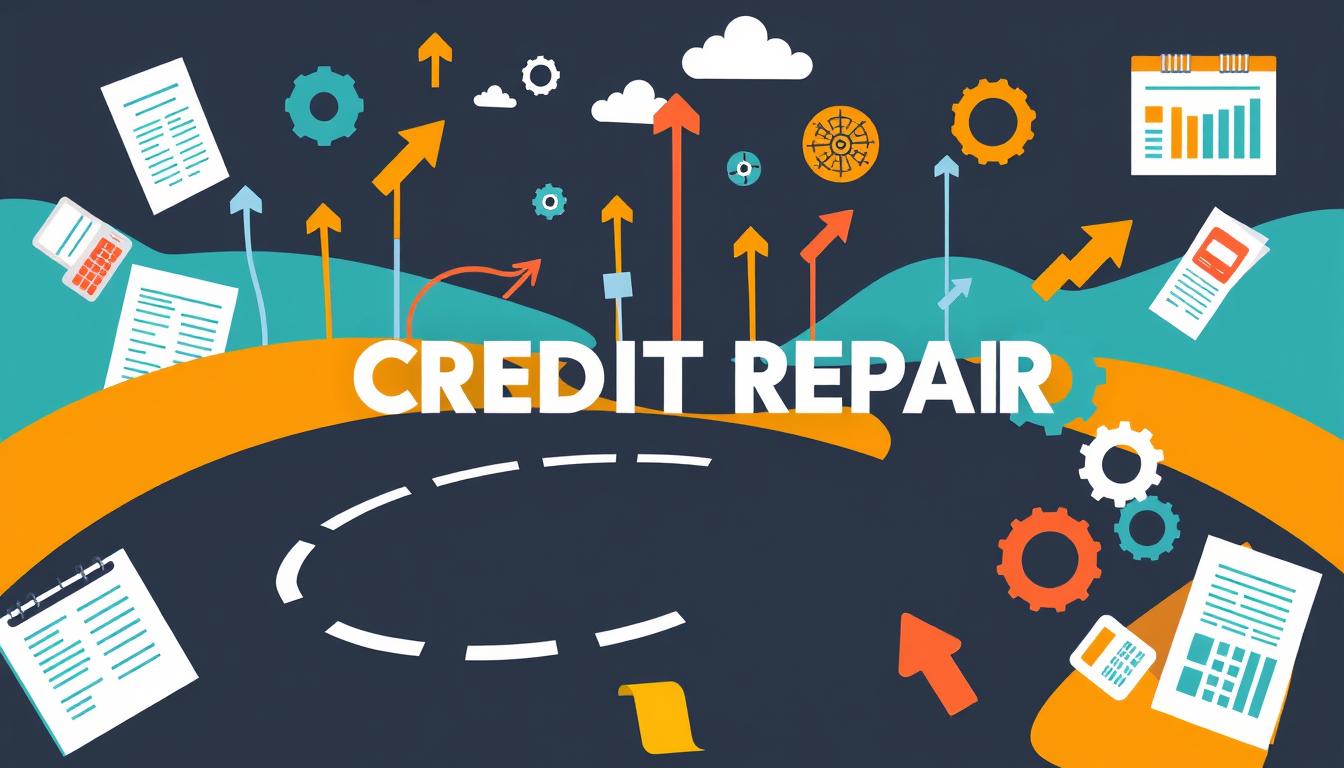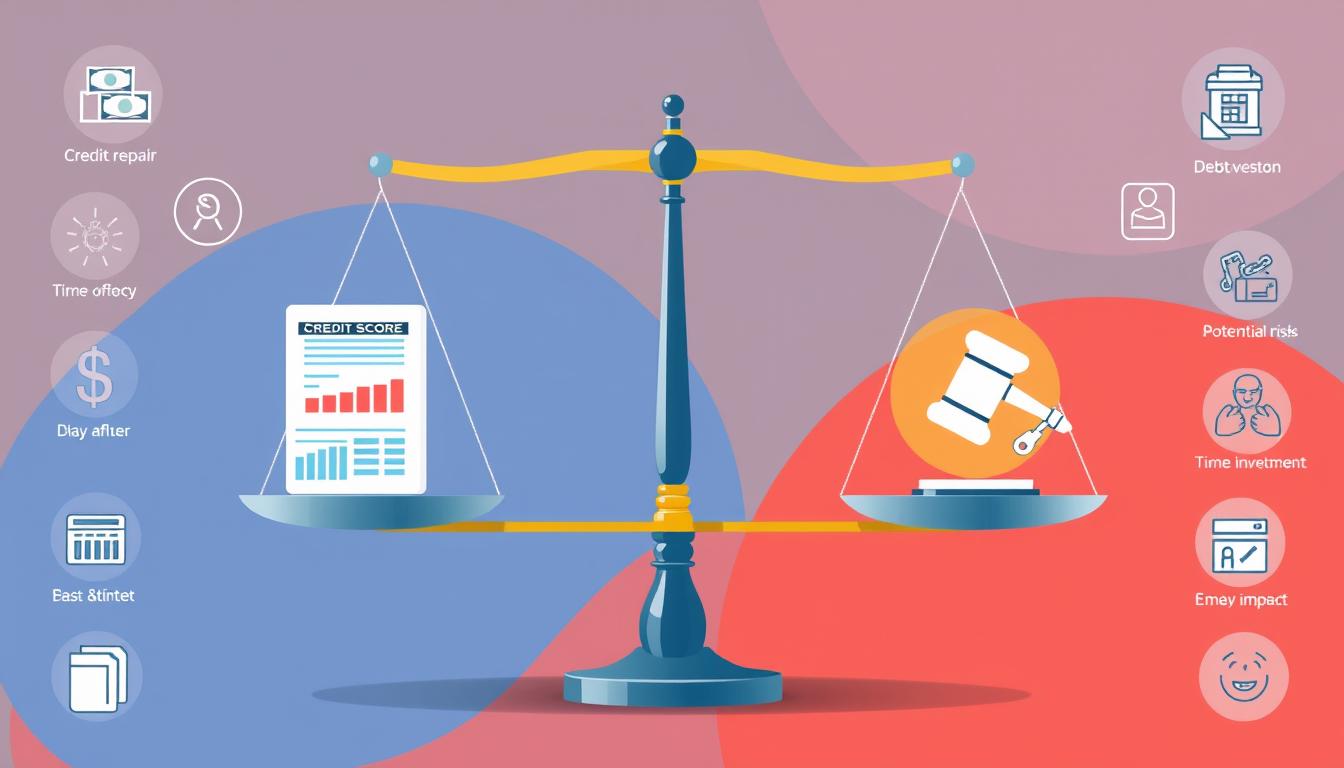Managing your financial well-being can be challenging. Many people struggle to choose between credit repair and debt settlement strategies. This guide explores the key differences between these two approaches.
We’ll examine the benefits, drawbacks, and financial implications of each method. Our goal is to help you make an informed decision about your unique financial situation.
Key Takeaways
- Credit repair and debt settlement are two distinct strategies for managing and improving one’s financial health.
- Credit repair focuses on addressing and correcting inaccuracies or errors in your credit report, while debt settlement involves negotiating with creditors to reduce the overall amount owed.
- The impact on credit scores, costs, and time frames can vary significantly between credit repair and debt settlement.
- Seeking professional assistance is crucial when navigating the complexities of credit repair and debt settlement.
- AI Credit Repair (https://aicreditrepair.io/) offers a superior solution compared to traditional credit repair and debt settlement methods.
Introduction to Credit Repair and Debt Settlement
Personal finance can be tricky to navigate. Many people face financial challenges like mounting debt and poor credit scores. This section explores credit repair and debt settlement as key debt relief solutions.
Overview of Financial Challenges and Debt Management Strategies
High-interest rates, medical bills, job loss, or overspending can lead to financial troubles. It’s vital to explore various debt management strategies. These include credit repair options and debt settlement options.
Importance of Understanding Credit Repair and Debt Settlement Options
Knowing the differences between credit repair and debt settlement is crucial. This knowledge helps in making informed decisions about debt relief solutions. It empowers individuals to take steps towards financial stability.
“Tackling financial challenges head-on and exploring all available debt management strategies is the first step towards achieving long-term financial well-being.”
The next sections will explain credit repair and debt settlement in detail. We’ll cover their pros, cons, and impact on credit scores. This information will help you choose the best path to financial freedom.
What is Credit Repair?
Credit repair identifies and fixes errors in your credit report. It aims to boost your credit score and improve your financial standing.
Definition and Purpose of Credit Repair
Credit repair involves reviewing and disputing errors on your credit report. The goal is to remove negative items and increase your credit score improvement.
By fixing these issues, you can access better loans and credit cards. This process opens up more financial opportunities for you.
Key Steps Involved in the Credit Repair Process
The credit repair process typically involves the following key steps:
- Obtaining a copy of the individual’s credit report from the three major credit bureaus (Equifax, Experian, and TransUnion).
- Carefully reviewing the credit report to identify any credit repair definition errors, such as inaccurate account information, fraudulent activity, or outdated negative items.
- Disputing the identified errors with the credit bureaus, providing evidence and documentation to support the claims.
- Negotiating with creditors and lenders to resolve any credit repair purpose negative items on the credit report.
- Monitoring the credit report to ensure that the disputed items are removed or corrected, leading to a gradual credit repair process improvement in the individual’s credit score.
These steps help you tackle issues in your credit history. They can enhance your financial well-being and create new opportunities.

Advantages and Disadvantages of Credit Repair
Credit repair can help those with poor credit scores and negative items on their reports. It’s crucial to know the pros and cons of this approach. Let’s explore the potential benefits and drawbacks of credit repair.
Potential Advantages of Credit Repair
- Improved Credit Scores: Credit repair aims to boost your score by removing inaccurate or unverifiable negative items from your report.
- Enhanced Financial Opportunities: A higher credit score can lead to better interest rates and loan terms. It may also improve your chances of credit card approval and rental applications.
- Regained Financial Stability: Addressing credit issues helps you regain control over your finances. This can put you on track to achieve your long-term money goals.
Potential Drawbacks of Credit Repair
- Time-Consuming Process: Credit repair can be lengthy and meticulous. It takes significant effort to dispute and remove negative items from your report.
- Limited Success: Credit repair may not remove all negative items. Accurate and verifiable information often remains on your report.
- Temporary Credit Score Impact: Your credit score might dip temporarily during the repair process. This happens as negative items are investigated and disputed.
| Credit Repair Benefits | Credit Repair Drawbacks |
|---|---|
| Improved credit scores | Time-consuming process |
| Enhanced financial opportunities | Limited success in removing all negative items |
| Regained financial stability | Temporary credit score impact |
Knowing the pros and cons of credit repair helps you make smart choices. You can decide if this strategy fits your financial goals and needs.
“Credit repair can be a powerful tool, but it’s important to weigh the potential benefits against the possible drawbacks before deciding if it’s the right approach for your financial situation.”
What is Debt Settlement?
Debt settlement is a popular debt relief strategy. It helps people struggling with overwhelming debt. Creditors accept a lump-sum payment that’s less than the total amount owed.
Definition and Purpose of Debt Settlement
Debt settlement, or debt negotiation, reduces the total outstanding debt. It allows debtors to lower their debt burden significantly. Often, this reduction can be 50% or more through a one-time payment.
How Debt Settlement Works: The Negotiation Process
The debt settlement process typically involves the following steps:
- Identify and prioritize debts: The debtor or the debt settlement company will assess the individual’s outstanding debts and determine which ones are eligible for settlement.
- Negotiate with creditors: The negotiation process involves the debtor or the debt settlement company contacting creditors and proposing a lump-sum payment that is less than the total amount owed. Creditors may be willing to accept a reduced payment to avoid the cost and uncertainty of pursuing the full debt through legal channels.
- Settle the debt: If the creditor agrees to the proposed settlement, the debtor will typically be required to make a lump-sum payment, often in a single installment, to resolve the debt.
Successful negotiations with creditors can greatly reduce total debt. This helps individuals work towards better financial stability. It offers a path to overcome overwhelming financial burdens.
Advantages and Disadvantages of Debt Settlement
Debt settlement offers benefits but also has risks. It’s important to understand both sides before deciding if it’s right for you. Let’s explore the pros and cons of this financial strategy.
Potential Benefits of Debt Settlement
- Reduced debt burden: Debt settlement aims to negotiate with creditors to settle debts for less than the full amount owed, potentially eliminating a substantial portion of the debt.
- Debt settlement benefits can include improved cash flow and reduced monthly payments, providing financial relief for those struggling with overwhelming debt.
Potential Risks and Drawbacks of Debt Settlement
Debt settlement has several risks and drawbacks. It’s crucial to consider these factors carefully before moving forward.
- Debt settlement risks include a significant negative impact on credit scores, which can make it more difficult to obtain credit, secure housing, or even find employment in the future.
- Creditors may still pursue legal action, such as lawsuits or wage garnishment, in an effort to recover the full debt amount, even after a settlement agreement has been reached.
- The tax implications of debt settlement can be complex, as the forgiven debt may be considered taxable income, potentially resulting in unexpected tax liabilities.
- Consumers may face financial consequences in the form of late fees, penalties, and additional interest charges during the debt settlement process, which can further erode their financial stability.
| Debt Settlement Benefits | Debt Settlement Risks |
|---|---|
| Reduced debt burden | Negative impact on credit score |
| Improved cash flow and reduced monthly payments | Potential legal action by creditors |
| Tax implications of forgiven debt | |
| Financial consequences (late fees, penalties, interest charges) |
Think about the pros and cons of debt settlement carefully. This will help you decide if it fits your financial goals and risk tolerance. Make an informed choice that’s best for your situation.
credit repair vs debt settlement
Credit repair and debt settlement are two different strategies for managing debt. They vary in their processes, costs, and effects on credit scores. Understanding these differences is crucial for making informed financial decisions.
Key Differences Between Credit Repair and Debt Settlement
Credit repair aims to improve credit scores by disputing inaccurate information on credit reports. It’s a methodical process that addresses each item individually.
Debt settlement involves negotiating with creditors to reduce the total amount owed. This often results in a one-time payment to settle the debt.
The timeline for these strategies differs significantly. Credit repair is a longer process, while debt settlement can be completed in several months.
Comparison of Costs and Time Frames
| Factors | Credit Repair | Debt Settlement |
|---|---|---|
| Costs | Typically lower, with monthly fees ranging from $50 to $150 | Often higher, with fees ranging from 15% to 25% of the total debt settled |
| Time Frame | 6 months to 1 year or longer, depending on the complexity of the credit report | 3 to 6 months, on average, to complete the negotiation process |
Choosing between credit repair and debt settlement depends on your financial situation and goals. Consider your credit history and long-term debt management objectives when deciding.
Selecting the right debt management strategy is crucial for your financial well-being. Carefully weigh the pros and cons of each option before making a decision.

Impact on Credit Scores
Understanding how credit repair and debt settlement affect your credit score is vital. These strategies have different impacts on your financial health. It’s important to consider the pros and cons of each approach.
How Credit Repair Affects Your Credit Score
Credit repair can significantly improve your credit score over time. It addresses errors and negative items on your credit report. This process can boost your credit utilization ratio and payment history.
As issues are resolved, your credit score may gradually increase. Credit repair is a powerful tool for enhancing your financial standing.
How Debt Settlement Affects Your Credit Score
Debt settlement can have an immediate, but potentially harmful impact on your credit score. It involves negotiating with creditors to settle debts for less than owed.
This appears as a “settled” or “partial payment” on your credit report. Such entries can negatively affect your score, showing inability to pay full debts.
| Comparison | Credit Repair | Debt Settlement |
|---|---|---|
| Impact on Credit Score | Gradual improvement by addressing errors and negative items | Immediate negative impact due to settled accounts |
| Timeline | Can take several months to see significant results | Immediate impact, but long-term credit recovery may be slower |
| Potential Risks | No direct risks, but success depends on the nature of credit issues | Increased risk of further credit score decline, potential legal issues |
Your choice between credit repair and debt settlement depends on your financial situation. Consider your goals and risk tolerance when deciding. Understanding credit score impacts helps you make informed decisions for long-term financial recovery.
Choosing the Right Strategy
Credit repair and debt settlement are two important financial choices. Your unique situation will determine which approach is best for you. Understanding key factors can help you pick the right debt management strategy.
Factors to Consider
Several important factors come into play when deciding between credit repair and debt settlement:
- Severity of Debt – Credit repair suits manageable debt. For significant debt, debt settlement might be a better solution.
- Ability to Make Payments – Credit repair requires on-time payments. If that’s challenging, debt settlement could be more suitable.
- Desired Timeline for Recovery – Credit repair is slower. Debt settlement resolves debt faster but may impact your credit score more.
- Financial Situation and Debt Management Goals – Assess your current finances and long-term goals to choose the right strategy.
Seek professional guidance to make the best decision for your financial health. A financial advisor can offer valuable insights about credit repair and debt settlement.
They can help you navigate the complexities of these options. Their expertise ensures you’re on the right path to financial wellbeing.

“The key to making the right choice is understanding your unique financial circumstances and long-term goals. Professional guidance can be invaluable in this process.”
Working with Professionals
Credit repair and debt settlement are complex tasks. Expert guidance can make a big difference. Qualified professionals can help you on your path to financial recovery.
The Importance of Seeking Professional Assistance
Credit repair and debt settlement involve tricky legal and financial issues. These can be hard for individuals to handle alone. Professionals have the know-how to guide you through the process.
Credit counselors, debt settlement companies, and legal experts can help. They ensure you make smart choices and avoid potential problems.
How AI Credit Repair (https://aicreditrepair.io/) is Better Than Both Credit Repair and Debt Settlement
Traditional credit repair and debt settlement services can be useful. However, AI-powered solutions like AI Credit Repair (https://aicreditrepair.io/) offer a more advanced approach.
AI Credit Repair uses artificial intelligence and machine learning. It combines the benefits of credit repair and debt settlement. This provides a tailored solution to improve your credit score and manage debt.
- AI Credit Repair offers a streamlined and automated process, reducing the time and effort required to address your financial challenges.
- The AI-driven technology analyzes your credit reports and debt profile, identifying the most effective strategies to improve your financial standing.
- With AI Credit Repair, you can benefit from the expertise of financial professionals without the high costs associated with traditional credit repair or debt settlement services.
Professional help and innovative solutions like AI Credit Repair can transform your finances. You can take charge of your financial future. Achieve the financial recovery you deserve.
Success Stories and Case Studies
Credit repair and debt settlement can seem complex. Yet, real-world success stories offer hope and inspiration. These examples show how effective debt management strategies can change lives.
Overcoming Debt and Rebuilding Credit
Sara, a young professional, struggled with mounting credit card debt. She enrolled in a credit repair program for help. With guidance, Sara disputed inaccurate items and negotiated with creditors.
In 18 months, her credit score increased by over 100 points. This improvement allowed Sara to secure a home loan with favorable terms.
Debt Settlement Success Story
John, a small business owner, faced financial trouble due to unexpected setbacks. He turned to a debt settlement company for help. Specialists assessed his situation and negotiated with creditors.
The result was a significant reduction in John’s overall debt burden. This allowed him to regain control of his finances and focus on business growth.
| Financial Recovery Indicators | Credit Repair | Debt Settlement |
|---|---|---|
| Average Increase in Credit Score | 80-100 points | 60-90 points |
| Average Debt Reduction | N/A | 30-50% |
| Average Time to Completion | 6-12 months | 24-36 months |
These stories show how credit repair and debt settlement can transform lives. They demonstrate how these strategies help people regain financial control. Such approaches can pave the way for a brighter financial future.
“Credit repair and debt settlement have been game-changers for me. I’m grateful for the guidance and support I received, which allowed me to get back on my feet and achieve my financial goals.”

Conclusion
Credit repair and debt settlement are different debt management strategies. Credit repair aims to improve your credit score by fixing errors. Debt settlement tries to reduce the amount you owe through negotiation.
Your choice depends on your financial situation and goals. Weighing the pros and cons helps you make an informed decision. Experts like AI Credit Repair can guide you through debt management complexities.
The main goal is to regain control of your finances. Addressing the root causes of your money issues is crucial. This approach sets the stage for long-term financial stability.
By managing your debt effectively, you can pursue your personal and professional goals. It paves the way for a brighter financial future.
FAQ
What is the difference between credit repair and debt settlement?
How does credit repair affect my credit score?
What are the potential risks and drawbacks of debt settlement?
How do I choose between credit repair and debt settlement?
Why is it important to work with professionals when dealing with credit repair or debt settlement?
How does AI Credit Repair offer a better solution compared to traditional credit repair and debt settlement?
Source Links
- southdistrictgroup – https://www.southdistrictgroup.com/blog/debt-management-vs-debt-settlement-solutions
- What’s the Difference Between Debt Consolidation and Debt Settlement? – https://www.investopedia.com/ask/answers/110614/whats-difference-between-debt-consolidation-and-debt-settlement.asp
- Debt Settlement Attorney – Debt Management – Richard West – https://www.debtfreeohio.com/legal-services/non-bankruptcy-options/

